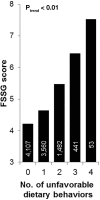Gastroesophageal reflux disease symptoms and dietary behaviors are significant correlates of short sleep duration in the general population: the Nagahama Study
- PMID: 25364076
- PMCID: PMC4196064
- DOI: 10.5665/sleep.4176
Gastroesophageal reflux disease symptoms and dietary behaviors are significant correlates of short sleep duration in the general population: the Nagahama Study
Abstract
Study objectives: To examine relationships among gastroesophageal reflux disease (GERD) symptoms, dietary behaviors, and sleep duration in the general population.
Design: Cross-sectional.
Setting: Community-based.
Participants: There were 9,643 participants selected from the general population (54 ± 13 y).
Interventions: None.
Measurements and results: Sleep duration, sleep habits, and unfavorable dietary behaviors of each participant were assessed with a structured questionnaire. Participants were categorized into five groups according to their sleep duration: less than 5 h, 5 to less than 6 h, 6 to less than 7 h, 7 to less than 8 h, and 8 or more h per day. GERD was evaluated using the Frequency Scale for the Symptoms of GERD (FSSG) and participants having an FSSG score of 8 or more or those under treatment of GERD were defined as having GERD. Trend analysis showed that both the FSSG score and the number of unfavorable dietary habits increased with decreasing sleep duration. Further, multiple logistic regression analysis showed that both the presence of GERD (odds ratio = 1.19, 95% confidence interval (CI) = 1.07-1.32) and the number of unfavorable dietary behaviors (odds ratio = 1.19, 95% CI = 1.13-1.26) were independent and potent factors to identify participants with short sleep duration even after controlling for other confounding factors.
Conclusion: The current study showed that both GERD symptoms and unfavorable dietary behaviors were significant correlates of short sleep duration independently of each other in a large sample from the general population.
Keywords: dietary behavior; gastroesophageal reflux disease; general population; sleep duration.
Figures


Similar articles
-
Bidirectional correlation between gastroesophageal reflux disease and sleep problems: a systematic review and meta-analysis.PeerJ. 2024 Apr 16;12:e17202. doi: 10.7717/peerj.17202. eCollection 2024. PeerJ. 2024. PMID: 38646475 Free PMC article.
-
Lifestyle factors affecting gastroesophageal reflux disease symptoms: a cross-sectional study of healthy 19864 adults using FSSG scores.BMC Med. 2012 May 3;10:45. doi: 10.1186/1741-7015-10-45. BMC Med. 2012. PMID: 22554226 Free PMC article.
-
Reduction in Gastroesophageal Reflux Disease Symptoms Is Associated with Miso Soup Intake in a Population-Based Cross-Sectional Study: The Nagahama Study.J Nutr Sci Vitaminol (Tokyo). 2018;64(5):367-373. doi: 10.3177/jnsv.64.367. J Nutr Sci Vitaminol (Tokyo). 2018. PMID: 30381627
-
Associations of the timing of sleep and meals with the presence of gastroesophageal reflux disease in community-dwelling women in Japan.J Hum Nutr Diet. 2023 Oct;36(5):2026-2035. doi: 10.1111/jhn.13207. Epub 2023 Jul 15. J Hum Nutr Diet. 2023. PMID: 37452755
-
Gastroesophageal reflux disease: recent advances and its association with sleep.Ann N Y Acad Sci. 2016 Sep;1380(1):195-203. doi: 10.1111/nyas.13143. Epub 2016 Jul 8. Ann N Y Acad Sci. 2016. PMID: 27391766 Review.
Cited by
-
Short sleep is associated with more depressive symptoms in a multi-ethnic cohort of older adults.Sleep Med. 2017 Dec;40:58-62. doi: 10.1016/j.sleep.2017.09.019. Epub 2017 Oct 9. Sleep Med. 2017. PMID: 29221780 Free PMC article.
-
Prevalence and risk factors of gastro-esophageal reflux disease among undergraduate medical students from a southern Indian medical school: a cross-sectional study.BMC Res Notes. 2018 Jul 9;11(1):448. doi: 10.1186/s13104-018-3569-1. BMC Res Notes. 2018. PMID: 29986748 Free PMC article.
-
Bidirectional correlation between gastroesophageal reflux disease and sleep problems: a systematic review and meta-analysis.PeerJ. 2024 Apr 16;12:e17202. doi: 10.7717/peerj.17202. eCollection 2024. PeerJ. 2024. PMID: 38646475 Free PMC article.
-
Lifestyle interventions can reduce the risk of Barrett's esophagus: a systematic review and meta-analysis of 62 studies involving 250,157 participants.Cancer Med. 2021 Aug;10(15):5297-5320. doi: 10.1002/cam4.4061. Epub 2021 Jun 15. Cancer Med. 2021. PMID: 34128354 Free PMC article.
-
Combined association of clinical and lifestyle factors with non-restorative sleep: The Nagahama Study.PLoS One. 2017 Mar 9;12(3):e0171849. doi: 10.1371/journal.pone.0171849. eCollection 2017. PLoS One. 2017. PMID: 28278155 Free PMC article.
References
-
- Wu MC, Yang YC, Wu JS, Wang RH, Lu FH, Chang CJ. Short sleep duration associated with a higher prevalence of metabolic syndrome in an apparently healthy population. Prev Med. 2012;55:305–9. - PubMed
-
- Choi KM, Lee JS, Park HS, Baik SH, Choi DS, Kim SM. Relationship between sleep duration and the metabolic syndrome: Korean National Health and Nutrition Survey 2001. Int J Obes (Lond) 2008;32:1091–7. - PubMed
Publication types
MeSH terms
LinkOut - more resources
Full Text Sources
Other Literature Sources
Medical

